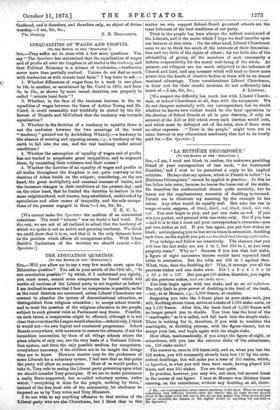INEQUALITIES OF WAGES AND PROFITS.
[TO THE EDITOR OF THE "SPECTATOR."]
Sin,—Pray suffer me to close with a few more questions. You -say " The Spectator has maintained that the equalisation of wages and of profits all over the kingdom in all trades is the tendency, and that Political Economy is a science of tendencies,—tendencies -never more than partially realised. Unions do not deal so much with tendencies as with minute local facts." I beg leave to ask :- 1. Whether differences of wages from 6s. a week in one place to 16s. in another, as ascertained by Mr. Caird in 1850, and from 8s. to 20s., as shown by more recent statistios, can properly be called "minute local facts " ?
2. Whether, in the face of the immense increase in the in- -equalities of wages between the times of Arthur Young and Mr. Caird, it could reasonably and truthfully be stated by the fol- lowers of Ricardo and McCulloch that the tendency was towards equalisation ?
3. Whether in the doctrine of a tendency to equality there is not the confusion between the two meanings of the word -" tendency " pointed out by Archbishop I'Vhately,—a tendency in the absence of existing and opposing causes, e.g., a tendency of the -earth to fall into the sun, and the real tendency under actual conditions ?
4. Whether the assumption of equality of wages and of profits &as not tended to perpetuate great inequalities, and to augment them, by concealing their existence and their causes ?
6. Whether the doctrine of an equality of wages and profits in All trades throughout the kingdom is not quite contrary to the doctrine of Adam Smith on the subject ; considering, on the one hand, the great multiplicity and constant increase of trades, and the incessant changes in their conditions at the present day ; and on the other hand, that he limited the doctrine to traders in the same neighbourhood, well known, long established, undisturbed by speculation and other causes of inequality, and the sole occupa- tions of the persons engaged in them ?—I am, Sir, &c.,
T. E. C. L.
[We cannot make the Spectator the medium of an economical 'catechism. The word " minute " was no doubt a bad word. For the rest, we are not at all inclined to admit that the tendency of which we spoke is not an active and growing tendency. We think we could show that it is so, and that it is the only dynamic force in the problem which affects all occupations alike. With Adam Smith's limitations of the doctrine we should concur.—En. Spectator.]


































 Previous page
Previous page